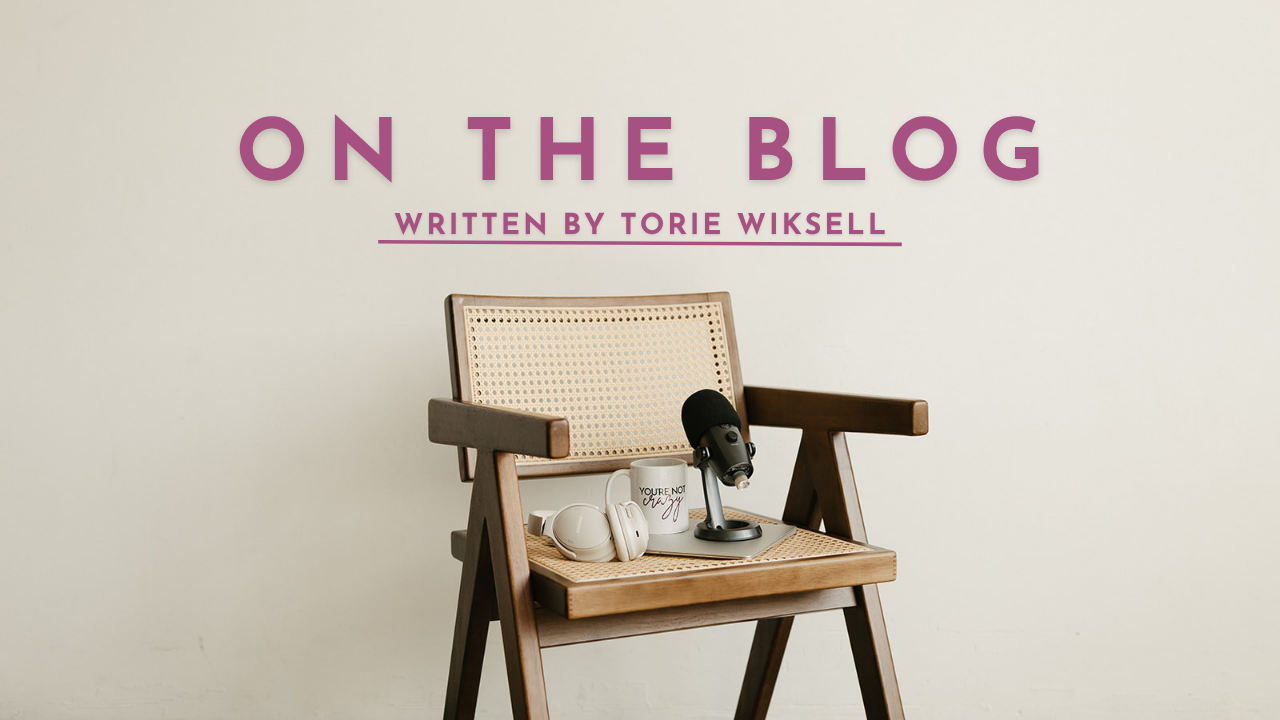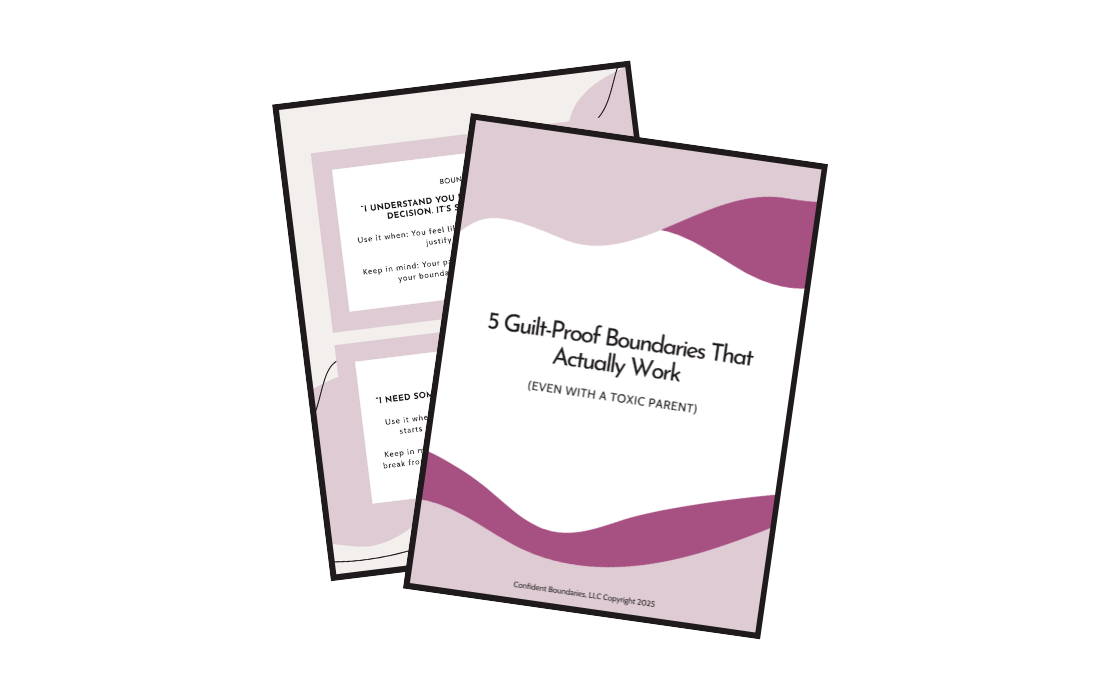
If You Grew Up With a Toxic Mom, These "Harmless" Comments Hit Different
If you're the adult child of a toxic mom, then you already know: some of the most hurtful things people say to you aren't screamed insults or overt attacks. They're the passive comments. The casually dropped, wildly invalidating one-liners that hit like a gut punch, just when you're starting to feel stable again. And after a weekend like Mother’s Day? Yeah, they hit even harder.
Let’s just name it: navigating life after growing up with an emotionally immature parent is not for the faint of heart. It’s lonely. It’s disorienting. And when you start setting boundaries with a toxic parent, the pushback doesn’t just come from them. It comes from the world around you. Friends, extended family, strangers on the internet. People who don’t get it. People who haven’t lived it.
And yet somehow, they’ve always got something to say.
"But she’s your mom. You have to forgive her."
Excuse me? Being a parent doesn’t give someone a lifetime pass to mistreat you. That's completely absurd. And toxic. Very, very toxic.
Forgiveness isn’t a requirement for healing. It’s a personal choice, and for a lot of us cycle breakers, it’s not part of the path at all.
Having a narcissist mom or an emotionally immature parent often means spending your entire childhood walking on eggshells, being blamed for everything, and never feeling good enough—no matter how hard you try.
So no, you don’t have to forgive her. What you have to do is protect your peace.
The Guilt Bombs People Love to Drop
Here’s another classic:
"When she dies, you’re going to regret this."
That’s not wisdom. That’s emotional manipulation. And honestly? It’s cruel. People don’t say this to offer comfort or clarity—they say it to shut you down. To guilt you into tolerating abuse a little longer. And it’s not okay.
If you grew up with a toxic mom, chances are you already carry more guilt than most people can imagine. You’ve probably spent years wondering if you’re the problem. You’ve probably been told you’re "too sensitive," or "so dramatic," or that you should "just let it go." These kinds of comments are a form of gaslighting—they twist your reality and leave you questioning your own experience.
But let me say this loud and clear: it’s not too much to want to be treated with basic respect. It’s not too much to want to feel emotionally safe in your own family. It’s not too much to want to be seen, supported, and believed.
You Are Not Too Sensitive
Let’s talk about that one. "You’re too sensitive."
This one is practically a rite of passage in toxic families. It's usually said after your parent says something cruel or inappropriate, and you finally push back.
It’s not that you’re too sensitive. It’s that they’re emotionally irresponsible. And instead of owning the harm they caused, they deflect it right back at you. This is one of the many ways emotionally immature parents avoid accountability. They make you feel like the problem when they crossed a boundary.
And if you're anything like me, you spent years internalizing that message. Believing it. Trying harder not to feel so much. Not to react. Not to take up space.
But sensitivity isn’t the problem. It never was. It’s what helped you survive. It's what made you attuned to everyone's moods in the first place. It's how you kept yourself safe. Sensitivity isn’t a weakness—it’s a survival skill you never should have had to develop in the first place that was then turned around and used against you.
"They Did the Best They Could" (Did They?)
Another line that makes me want to rip my hair out: "They did the best they could."
Look. Trauma is real. Many narcissistic and borderline parents have a long history of childhood trauma themselves. But trauma is an explanation, not an excuse.
I had a traumatic childhood growing up with a narcissist mom. That does not give me permission to claim I don't know better and turn around and mistreat my daughter. Being a parent comes with a responsibility to do better—taking accountability for our own toxic behaviors and seeking support filling in the gaps of knowledge we lack.
"Doing the best they could" doesn’t change the impact. You still deserved to feel safe. You still deserve to heal. You still deserve to set boundaries with your parents, regardless of their trauma history.
The Cult Vibes Are Real
I’ve said it before and I’ll say it again: being the cycle breaker in your family is a lot like leaving a cult.
You start questioning things you were always told not to question. You stop keeping the family’s secrets. You try to show up as your authentic self, even when your family would rather you play the role they've assigned to you. And suddenly? You're the villain.
You're the black sheep. You're "so ungrateful." You're "the problem." And everyone acts like you're the issue.
Boundary Setting Isn’t the Problem—It’s the Solution
Boundary setting with emotionally immature parents isn’t straightforward. These are people who thrive on control, chaos, and codependency. They aren’t looking to respect your needs—they’re looking to reestablish a dynamic that works for them. Unfortunately that dynamic tends to be incredibly toxic.
And when you disrupt that by setting boundaries? Expect pushback. Expect manipulation. Expect guilt.
But that doesn’t mean your boundaries aren’t working. That means they’re needed and need to be enforced. And, if you need help, check out my free workshop, Setting Boundaries with a Parent You Suspect has Borderline or Narcissistic Personality Disorder.
Here's What You Need to Know
-
Your experience is real. Even if no one else in your family will acknowledge it or even sees it.
-
Boundaries aren't cruel. They’re what help you break free from the toxicity.
-
Being the cycle breaker is hard. It's also worth it.
-
You are allowed to be angry. Anger is a normal response when someone mistreats you. It’s not toxic to be upset. It’s toxic to pretend everything’s fine when it’s not.
-
You don’t need to justify your boundaries to anyone. Especially not to people who are committed to misunderstanding you.
In Case You Need to Hear This Today
You’re not the problem.
You’re not ungrateful.
You’re not making a big deal out of nothing.
You are doing something incredibly brave. You are breaking the cycle of emotional manipulation, gaslighting, and shame that has been passed down for generations. That takes courage. That takes clarity. That takes a willingness to disappoint people in order to finally take care of yourself.
If you’re in the thick of it right now—maybe you’re just waking up to the dysfunction, going low contact, navigating a boundary backlash, or just recovering from another chaotic conversation with your narcissist mom—I see you.
And if you want more support than the occasional validating blog post, come hang with me inside the Confident Boundaries Membership. It’s where cycle breakers like you get the tools, coaching, and community they actually need to keep going.
Inside, you’ll find:
-
Live group coaching every Monday and Thursday
-
A private space to ask questions and get support
- Monthly workshops on topics like gaslighting, acceptance, and going no-contact
-
A resource library with help setting boundaries with toxic parents
-
Bonus podcast episodes of the You're Not Crazy Podcast
You don’t have to do this alone.
Setting boundaries with a toxic parent might feel impossible. But I promise you: it’s absolutely not.
Take the first step. Even though you’re scared.
Your peace, your sanity, and your happiness are worth protecting.
You’re Not Crazy.
But you might have been gaslit by your parents.
Learn how to recognize the signs—and start rebuilding trust in yourself.
I hate SPAM. I will never sell your information, for any reason.



